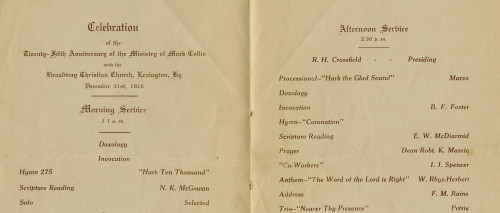
Website Search
The Community Collections consist of objects shared from local community residents and organizations. Individuals have lent items of local significance to the library to give the larger community awareness and access.
Together, we’ll enrich our Lexington Public Library for the next 230 years.
Tracing its history back to 1795, the Lexington Public Library is a gateway to knowledge, a bridge to opportunity, and a hub for community connection. The name of the society honors that legacy — when a small group of citizens came together to create something lasting for their community - a library positioned to evolve to meet the ever changing needs of our community.
Members of the 1795 Society are philanthropic leaders and dedicated library champions. Supporters make a three-year pledge of at least $1,000 per year - whether you are an individual donor interested in making an annual or monthly gift, you are making your estate plans, or you are a corporate partner looking to connect your organization to community impact, we invite you to join this legacy of connection, learning, and leadership in support of the public library!
Join the 1795 Society, a community who enable the Library’s critical work and build a legacy of learning, access and opportunity for generations to come.
Community Reads is our Lexington-wide book group. Connect with your friends and neighbors by reading the selected book, joining in a book discussion or related program, and attending a book talk with this year's featured author.
You can request a "Bag of Books" to access our materials when you're unable to browse in person. Complete this form, and we'll pull up to 10 items that match your specified interests. You can help us locate more items by keeping your requests general.
Please complete this form to request a Preschool Storytime Kit. Kits may be borrowed for 2 weeks. Each kit contains: 5-7 books, a binder with songs, action rhymes, and fingerplays, and several classroom manipulatives for activities.
Help us make digital archives searchable, from anywhere.

Black Community News

All Digital Archives Collections

Black Community News Collection
All Digital Archives Collections
The Lexington Public Library is pleased to offer teachers, childcare providers, and homeschooling families the "Bucket of Books" service. We can supplement your curriculum with specially-selected books on a particular topic or provide your classroom with specially-selected books for your students' pleasure reading.
Meet with a librarian for one-on-one consultation. Please submit the Book a Librarian Appointment Request Form or call 859-231-5500 during business hours to schedule an appointment. Appointments are scheduled Monday-Friday during Library business hours and typically last 30 to 45 minutes.
The Eastside Branch Makerspace, located at 3000 Blake James Drive, is a collaborative workspace for ages 13 and up to make, learn , explore, and share, free of charge. Staff are available during open studio hours to assist in projects of all kinds, or contact Makerspace staff to schedule one-on-one help. Not sure where to start? The Eastside Makerspace also offers regular workshops that introduce participants to new skills, technology, and equipment. Planning to bring a group of 10 or more? Please contact us by calling 859-231-5500 ext.2207 or using the link below.
Sample projects
Engrave a welcome sign, 3D print a business card holder, laminate a sign for your classroom, print a banner for your next event, make a personalized magnet for your refrigerator, sew a quilt block, or cut a vinyl design for your water bottle.
The William Stamps Farish, III Theater at the Central Library is available to the community for lectures, live music, community forums, film festivals, small theatrical productions, dance performances, literary readings, debates, and other creative uses.
If books are your thing, this is your place. Browse the newest titles in our collection, take a deep dive into comics and graphic novels with the 741.5 bulletin, request a personalized "bag of books," and more.
How can we help you? We've gathered a variety of resources for readers, students and educators, job seekers. entrepreneurs and nonprofits, and English language learners. Request items from other libraries through interlibrary loan.
Library meeting rooms are available for individuals, non-profit, for profit, study groups, and community organizations seeking to hold meetings, trainings, and workshops. Meeting rooms are free of charge. Sterno and other tools/equipment that have an open flame are prohibited.
The Lexington Public Library welcomes your time and talents! There are a number of volunteer opportunities available, and we will accommodate your preferences for location and hours as much as possible based on what we have available. From After School programs, to ESOL programs, to Makerspace open studio help, and beyond—we have a variety of opportunities for you to connect with your community through volunteering.
The Lexington Public Library is home to four collaborative creative spaces for making, learning, exploring, and sharing. These spaces offer a variety of events, high-tech and low-tech equipment for patron use, and serve as a space to build community, explore your creativity, and develop personal interests.
Sample projects
Film a music video, 3D print a fidget toy, digitize old family photos, sew a costume or mend your favorite pair of pants, embroider a t-shirt, comb bind a book, start a podcast, record in the audio booth, create content with the green screen, make custom magnets or buttons, engrave a keychain, print a poster, make custom stickers, and more.
The Lexington Public Library offers an Interlibrary Loan (ILL) service which allows cardholders in good standing to borrow books and receive copies of articles we do not own and cannot purchase. Our borrowing network includes over 4,000 participating public and academic libraries.
All the Library Can Be
The library is essential to a thriving community, ensuring equitable access to information, education, and technology for all. We raise funds to support Lexington Public Library programs, services, and special projects that go beyond what public dollars alone can support.
The Undesign the Redline project unearths the deep and systemic history of structural racism and inequality in the United States. This interactive exhibit explores policies like Redlining, their implications for today, and what we can do to undesign them.
The exhibit was created by social impact design studio designing the WE and has been invited to dozens of cities across the country. A local advisory group has helped to produce local history and stories about Redlining in Lexington.
Use this form to add a digital version of your library card to your digital wallet.
Eligible applicants can complete this form to apply for a digital library card.
Library meeting rooms are available for individuals, non-profit, for profit, study groups, and community organizations seeking to hold meetings, trainings, and workshops.






























